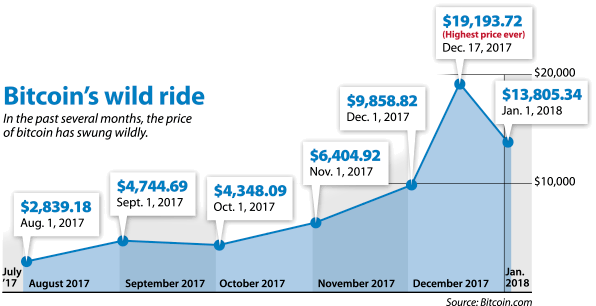Subscriber Benefit
As a subscriber you can listen to articles at work, in the car, or while you work out. Subscribe NowHave the eye-popping gains posted by bitcoin investors in the latter half of 2017 grabbed your attention? Has this made you consider adding cryptocurrencies to your wealth management portfolio? If you said yes, lawyers, investors and accountants say you’re in good company.
 Mitchell
MitchellHowever, they also warn you’ll be in for bumpy ride.
Kieron Mitchell, an accountant who opened the state’s first bitcoin ATM in 2015, said investors should calculate their own time horizon and propensity for risk before investing in one the hundreds of cryptocurrencies available. He said he has recommended clients take their total investment portfolio and allocate 2 percent to bitcoin.
“The volatility and the risk of that is the most that you can experience pretty much of any asset class that you would normally invest in for retirement purposes,” he said. “So, it’s not for the faint of heart.”
In just the past six months, the price of bitcoin has swung wildly.
 The price of one bitcoin was $2,839.18 on Aug. 1, 2017, according to bitcoin.com.
The price of one bitcoin was $2,839.18 on Aug. 1, 2017, according to bitcoin.com.
Cut to Dec. 17, 2017, and it had skyrocketed to $19,193.72, the highest price ever recorded. As the price sat at $782.79 exactly a year prior to that, it meant long-term investors were looking at 2,352 percent year-to-date return a week before Christmas.
In the month since that record-breaking day, the unpredictability has only continued as the market responded frantically to news of a government crackdown in South Korea.
 Gorham
GorhamThe Korean won is the third most-traded currency for bitcoin, right behind the U.S. dollar and the Japanese yen, according to Coinhills, which tracks values of numerous cryptocurrencies.
South Korean Finance Minister Kim Dong-yeon said in an interview Jan. 16 with local radio station TBS that banning trading in digital currencies was “a live option,” according media reports.
In reaction, between Jan. 16 and Jan. 17, the bitcoin price plunged from $13,571.21 to $11,504.56, a single-day loss of 15 percent in value.
 Overhauser
OverhauserJeff Gorham, a senior associate with Frost Brown Todd, does state-by-state money transmitter license analysis for bitcoin ATMs. He also works with companies bringing new cryptocurrencies to market. He said he encouraged younger speculators with greater risk appetites to get involved, but steered older investors away.
“Even my grandma at Christmas was asking me about bitcoin,” he said. “I (told her,) ‘At this point in your life, you’re in retirement or you’re nearing retirement, you don’t need to invest in this stuff.’”
Intellectual property attorney Paul Overhauser said he has been investing in alternate currencies since 2012. He now often offers service workers bitcoin as a tip instead of cash. He became one of the first lawyers in the state to accept bitcoin as payment in 2014. He said he was so optimistic about bitcoin’s potential he could easily see last month’s record high price surpassed in the coming months.
 Ross
Ross“Nobody knows what it’s going to do,” he said. “Plenty of other people think it’s going to go sky high.”
Robert Ross is the founder and developer of his own alternate currency — FoldingCoin — and was an early investor in bitcoin. He said he encouraged potential investors to research the underlying technology before taking the plunge.
“You need to think of it more as gambling, because nobody knows what’s going on,” he said. “What I’ve been telling people is next time you plan on going to the casino, that’s when you should buy bitcoin instead.”
Nick Merker is a partner at Ice Miller where he is the co-chair of the firm’s data security and privacy practice. Before that he was a computer scientist at the University of Illinois and later ran information protection at Cars.com.
 Merker
Merker“I’m kind of treating this like the gold rush, where a bunch of people are contemplating going out there and mining for gold,” he said. “I’m not advising anyone to do that, but if they want to do that I’ll sell them some shovels.”
Security concerns
Japanese business Mt. Gox was the world’s largest bitcoin exchange when it filed for bankruptcy protection in 2014. The company admitted hackers had stolen hundreds of thousands of customers’ bitcoins worth hundreds of millions of dollars. Only some of these have been recovered in the years since.
Bingham Greenebaum Doll LLP partner John McCauley pointed to this breach as a textbook example of the uncertainty inherent in such unregulated, decentralized, under-capitalized markets. Stock certificates destroyed in a fire can be replaced. Money deposited in banks is covered by the Federal Deposit Insurance Corporation. Cryptocurrency lost to hacking, however, would be nothing more than a memory.
 McCauley
McCauley“You’re not getting it back,” he said. “That’s an added layer of problems you don’t have even with regular investments.”
Adam S. Ira, an attorney with Kightlinger & Gray, said that while the exchanges may be hackable, keeping some bitcoin in a wealth management portfolio was a good insurance policy. He said ransomware attacks were often settled using a small amount of bitcoin.
“You don’t have much time when you’re hit with ransomware,” he said.
 Ira
IraGreg Duncan works with estate and wealth transfer and matrimonial law at Bingham Greenebaum Doll. He said because bitcoin wallets required passwords, investors should think about them the same way they would social media accounts and email addresses for estate planning purposes. Otherwise, surviving family members would be forced to “have to deal with somebody dying and nobody having the key,” he said.
Tax implications
The Internal Revenue Service considers bitcoin property rather than currency, according to the most recent guidance issued in 2014.
“It’s a barter transaction when you buy something for bitcoin,” said Mitchell.
 Duncan
DuncanIn the four years since the IRS issued these rules, the tax interpretations have varied. Many investors have been listing cryptocurrency swaps under IRC Section 1031 “like kind” exchanges. This would mean that one cryptocurrency could be traded for another with no tax. However, the recently passed Tax Reform and Jobs Act of 2017 limits these “like kind” exchanges to real estate.
Bitcoin holders’ gains and losses are treated by the IRS as capital gains, similar to stock. Investors in the highest tax bracket who hold bitcoin for the long term capital gains period will pay a 20 percent tax when they cash out, “which is really favorable,” Merker said.
“Since bitcoin is treated like property, that’s been an advantageous investment for high-net-worth folks that can hold an asset for a long time,” he said.•
Please enable JavaScript to view this content.
